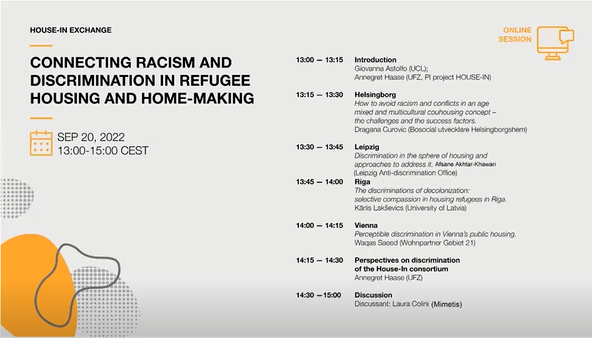Subscribe to our joint NEWSLETTER for
EUTROPIAN &
COOPERATIVE CITY MAGAZINE


On 20 September 2022, together with the Helmholtz Centre for Environmental Research (UFZ) and Eutropian, The DPU co-hosted an event on the topic of migrants access to housing. During this online workshop, policymakers, researchers and experts from NGOs presented cases from Leipzig, Riga, Lund and Vienna regarding the current situation of discrimination in housing in different contexts.
The event took place within the framework of the JPI Urban Europe funded project House-In, which focuses on challenges on housing-integration for migrant newcomers in European cities.
How can the perspective of housing and urban justice be embedded in anti-racist practices in housing for and by refugees?
Set against emergency response and double standards, the current housing crisis across European urban environments is increasingly affecting the infrastructure of settlement, exposing its enduring colonial perspective.
Project partners:
Helmholtz-Zentrum für Umweltforschung – UFZ, University of Latvia – Department of Anthropology Studies, Österreichische Akademie der Wissenschaften, Institut für Stadt- und Regionalforschung, Stadt Leipzig, Referat für Migration und Integration, Internationale Frauen Leipzig e.V., Zusammen e.V., Eutropian GmbH, Shelter Safe House, Lund University – Housing Development & Management, University College London – Development Planning Unit, Malmö University – School of Arts and Communication
In this video, Afsane Akhtar-Khawari discusses discrimination in the sphere of housing and approaches to address it. Akhtar-Khawari presented the work of the Anti-Discrimination office in Leipzig as well as the challenges they are facing. What does the Anti-Discrimination office do and how does it find out about the instances in which discrimination takes place? Find out more in this video.
Afsane Akhtar-Khawari works as an consultant at the Anti-Discrimination office in Leipzig, which is a bureau that offers support for those experiencing discrimination in different life situations, such as in housing and employment.
In this video, Karlis Lakševics from the University of Latvia discusses the discrimination of decolonization and the selective compassion in the housing of refugees in Riga. Who has access to housing and who does not? What is the connection between historical events and selective compassion in the housing market in Riga? Find out more in this video.
Karlis Lakševics is a researcher and lecturer at the Department of Cultural and Social Anthropology at the University of Latvia. Lakševics has contributed to the House-In project with insights into the situation of housing discrimination in Riga, Latvia.
In this video, Wagas Saeed from Wohnpartner discusses the perceptibility of discrimination in Vienna’s public housing. What is Wohnpartner and what do they do? How does Wohnpartner enhance fostering neighbourhood communities? Find out more in this video.
Wagas Saeed works in the office of Wohnpartner in the 21st district in Vienna, Austria. Wohnpartner is a subsidiary of the city on Vienna offering counselling, mediation and social support to residents living in municipal housing. Find more about Wohnpartner’s work here.
In this video, Dragana Curovic from Helsingborgshem, Sweden presents an age mixed and multicultural cohousing concept called Sällbo. Sällbo is located in Helsingborg, and how this can tackle racism and conflicts in housing. What is Sällbo and what makes it an example of inclusive housing? Find out more in this video.
Dragana Curovic is an integration specialist working at Helsingborgs’s municipal housing company Helsingborgshem. Curovic has contributed to the House-In project with insights into the situation of housing discrimination in Helsingborg, Sweden.
In this video, Annegret Haase from UFZ presented the perspectives on discrimination on behalf of the House-In Consortium. What have we learned about discrimination in housing during the House-In project, and what are the different dimensions of discrimination? Find out more in this video.
Annegret Haase works as a research associate at the Helmholtz Centre for Environmental Research. As one of the main partners of the House-In project, Haase has contributed with insights into the situation of housing discrimination in Leipzig, Germany.
Stay tuned for the presentations of the second House-In workshop, titled “How to cope with future refugee challenges – Learning with Ukraine”, for insights on how the specific housing needs of different migrant groups are being met and why responding quickly to fluctuating refugee situations is crucial for enhancing inclusion in housing.
HOUSE-IN is a 18 month research programme, which started in June 2021 and was funded by JPI Urban Europe.
The project partners are Helmholtz-Centre for Environmental Research, University of Latvia, Lund University, Malmö University, Austrian Academy of Sciences and Eutropian GmbH.
For more information on the project, don’t be shy, reach out to project leader Bahanur Nasya.
| Cookie | Duration | Description |
|---|---|---|
| cookielawinfo-checkbox-analytics | 11 months | This cookie is set by GDPR Cookie Consent plugin. The cookie is used to store the user consent for the cookies in the category "Analytics". |
| cookielawinfo-checkbox-functional | 11 months | The cookie is set by GDPR cookie consent to record the user consent for the cookies in the category "Functional". |
| cookielawinfo-checkbox-necessary | 11 months | This cookie is set by GDPR Cookie Consent plugin. The cookies is used to store the user consent for the cookies in the category "Necessary". |
| cookielawinfo-checkbox-others | 11 months | This cookie is set by GDPR Cookie Consent plugin. The cookie is used to store the user consent for the cookies in the category "Other. |
| cookielawinfo-checkbox-performance | 11 months | This cookie is set by GDPR Cookie Consent plugin. The cookie is used to store the user consent for the cookies in the category "Performance". |
| viewed_cookie_policy | 11 months | The cookie is set by the GDPR Cookie Consent plugin and is used to store whether or not user has consented to the use of cookies. It does not store any personal data. |
